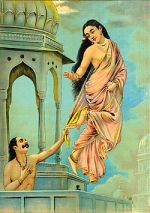Indian Cinema has, for long, been portraying obsessed lovers. Some of them possess an extra-ordinary verbal communication style (K-K-K-K-Kiran). Others possess supposedly cool hairstyles. And some have a story where they leave the world for somebody and then that ‘somebody’ leaves them. When you go back in time, you see the same happening in Mahabharata too and the victims such tragedies are mostly the kings. Would you really be that interested if it were to happen to a commoner anyway?!
Pururava was a young and handsome king. When I say young and handsome, it means that practicing warrior-skills, hunting and partying were his major hobbies. Administration of kingdom, for such kings, was usually the second priority. There are a very few examples of kings who were young and handsome and capable at the same time. Unfortunately, Pururava was not. And before he could make his transition from young and handsome to capable, something happened!
Once when he was out hunting in a forest, he came across the apsara (river-nymph) Urvashi. The sight of the scantily dressed apsara, who was a favourite even among the Devas, was definitely the most enthralling sight of Pururava’s youth.
With the confidence characteristic of kings and attitude characteristic of self-proclaimed handsome men, Pururava went to Urvashi and asked her out.
***
Pururava: The Almighty must have exhausted all his creativity in carving a beauty like you. What would it take of me to make you mine? I want you to marry me and be my queen.
Urvashi: No ordinary man can ask me out in this fashion. Your confidence and your flashy attire indicate that you are from the royal bloodline. But are you worthy enough for the beautiful creation of the Almighty like you just said?
Pururava: There is no feat in this world impossible for me to perform as long as I possess my bow and arrows. You can be sure about me.
Urvashi: I would rather marry a lover than a warrior. I don’t seek the power of your weapons, I only seek the power of your words. You will have to promise me that you will take care of my pet goats. They are very dear to me. Also, promise me that except for me you will never appear naked in front of anybody. If you are willing to make these two promises, I will marry you.
Pururava: I am a Kshatriya, to protect the helpless is my Dharma. Will I not protect your goats? I promise I will. And I will protect your second promise too. My Kshatriya instincts are not limited to people alone!
***
These promises were perhaps Urvashi’s ways of ensuring that her husband remains loyal to her concerns and never brings in a second wife that decreases her importance. Pururava didn’t think much before making the promises either. The Kshatriya factor often deluded the decision making powers of the kings. Anyway, they both got married and lived happily for some time, increasing the prospective candidates for the royal inheritance and inspiring stories that would be carved out later in Indian temples meant for selective visitors.
Indra, the original boss of apsaras, could not bear this long separation from the apple of his eye, Urvashi. He wanted her back at any cost, so he ordered the gandharvas to bring Urvashi back. The gandharvas stole the pet goats of Urvashi one day when Pururava was busy making love to her. Urvashi, on realizing that her goats had been stolen, requested Pururava to rescue them. He hurried out without bothering to cover himself keen to keep the first promise he made to his wife while forgetting the second one. At that moment, Indra launched a thunder in the sky causing a public display of the king’s private properties.
In spite of his best efforts, Pururava could not keep both his promises. Urvashi decided to leave Pururava the way he was, not continuing her stay with the husband king since the promises that were the basis of their marriage were broken.
The separation left Pururava devastated and he lost all sense. He isolated himself from his kingdom and became mad, not being able to rule the kingdom anymore. Had India had access to Italian Marble in those days, a Taj Mahal would have come into existence much before in Indian History than when it actually did. Pururava was replaced by one of his more capable sons.
The story of Pururava and Urvashi holds relevance for two major reasons in the Mahabharata:
1. Generations later, much like Pururava, Shantanu was also smitten by beautiful nymphs/ladies. First, it was Ganga to whom he made promises without giving any thought and then Satyavati, to whom he did not make any promises but somehow the situation was quite similar (wait for the related post).
2. When Arjuna visited Amravati during the exile, he was approached by Urvashi with amorous intents. He politely declined the tempting offer of the celestial beauty following the code of conduct of his civilization which ended in his being cursed by her.
Numerous incidents of previous generations keep on influencing the course of lives and decisions of characters throughout the Mahabharata.


 Chandra, the prince of the night that he was, didn’t leave Tara with a reason to complain. Tara left with Chandra leaving Brihaspati alone.
Chandra, the prince of the night that he was, didn’t leave Tara with a reason to complain. Tara left with Chandra leaving Brihaspati alone.